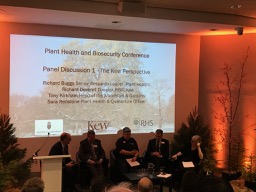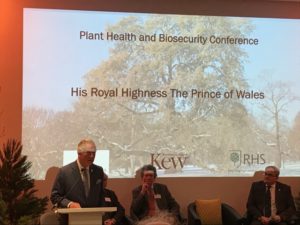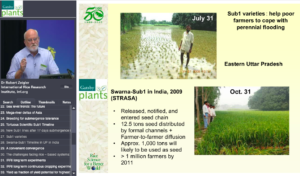This month’s topic came to mind easily – Resilience. With Australian fires and UK floods in the news, it’s easy to see that plants can be destroyed in the extreme weather that comes with climate change. How does this relate to plant health? Just as humans are vulnerable to infections when stressed, plants subjected to extremes of e.g. heat, cold, drought and floods are susceptible to invading pests and pathogens. Knowing how to grow plants that are more resilient will protect our crops and environment.
 Resilience was also a key topic at the Plant Health and Biosecurity Conference I attended at Kew on Thursday 20th February where Richard Buggs explained ongoing work on identifying resistance to ash dieback. You can see a video on this work in last month’s blog
Resilience was also a key topic at the Plant Health and Biosecurity Conference I attended at Kew on Thursday 20th February where Richard Buggs explained ongoing work on identifying resistance to ash dieback. You can see a video on this work in last month’s blog
https://celiaknightconsulting.co.uk/international-year-of-plant-health-january-2020/
HRH Prince Charles attended to give a concluding speech and encouraged everyone to take plant health and biosecurity seriously. https://www.telegraph.co.uk/royal-family/2020/02/20/prince-charles-laments-appalling-tragedy-britains-lost-oaks/
Resilience relates to key message 4 from the FAO Invest in plant health capacity development, research and outreach https://celiaknightconsulting.co.uk/international-year-of-plant-health-what-does-that-mean-for-me/ In short, extreme climates will destroy plants but plant scientists are researching how to limit the damage by understanding the mechanisms in those plant parts able to withstand extreme environmental stresses. It’s essential that the research developments our industries and agricultural practices use are built on evidence from the scientific community, but research takes a long time.
Here’s a brief story and links to demonstrate how research works. Simply put, rice is a world staple crop whose roots tolerate being submerged in water; how does it do that and could that knowledge be useful for other plants in floods?
In 2011, Dr Robert Zeigler, the then Director of the International Rice Research Institute (IRRI) in The Philippines gave a talk at the Gatsby Plants Undergraduate Summer School. The talk highlighted work that after 25 years identified a rice gene they called Sub1 which was essential for submergence-tolerance.  They were able to breed Sub1 into lines for field testing with spectacular results. The bottom picture shows an Indian farmer’s field with the new variety. The top picture shows the same crop in flooded conditions earlier in the season which would not have developed to maturity without Sub1.
They were able to breed Sub1 into lines for field testing with spectacular results. The bottom picture shows an Indian farmer’s field with the new variety. The top picture shows the same crop in flooded conditions earlier in the season which would not have developed to maturity without Sub1.
What has happened in the decade since 2010? This review by Emerick and Ronald from 2019 brings the story almost up to date. https://cshperspectives.cshlp.org/content/early/2019/06/10/cshperspect.a034637.full.pdf?ijkey=vP3gDtHXw7kOUrJ&keytype=finite An important concluding remark is that agronomists, social scientists, policy-makers and scientists all need to work together if the discovery is to be adopted widely.
Undergraduates studying Biology with a plant component may learn more about this and other plant science research stories. Excellent resources for teaching plant science can be found at http://www.plantcell.org/content/teaching-tools-plant-biology
Of course there will be other research outputs that help make plants more resilient to climate change in less than 30-40 years but many significant discoveries come from curiosity-driven research and training scientists to think broadly, so key message 4 is an important one.
